Biden SECDEF Pick on Hold?
Maybe it's not going to be Michèle Flournoy after all.
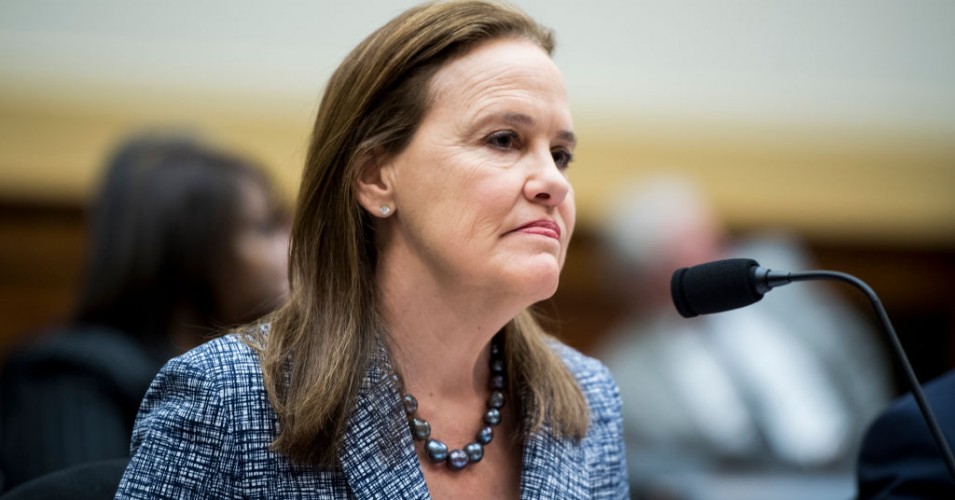
The President-Elect announced his national security team yesterday, including uncontroversial picks for State, National Security Advisor, UN Ambassador, and Homeland Security. Notably absent was his choice for Defense Secretary, widely assumed to be Michèle Flournoy. Several reports out suggest she may not be the nominee after all.
POLITICO (“Biden’s choice for secretary of Defense still in flux“):
While Flournoy is still a strong contender, six people close to the transition say Biden is not entirely sold on the woman who was widely seen as Hillary Clinton’s pick for Defense secretary if she had won the presidency in 2016.
Two former Obama White House officials who remain close to Biden said he never developed the kind of strong personal relationship with Flournoy that he has sought in his Cabinet picks, and once the dust settled after the election, Biden began leaning toward exploring other options.
Another top contender is Jeh Johnson, Obama’s second secretary of Homeland Security, the people said. He would be the first Black Defense secretary in an administration that has promised a diverse Cabinet.
“Michèle is still at the top of the list but they still want to keep looking — and that’s a change,” said a former senior national security official tracking the transition closely. The sense is: “Let’s not be rushed here.”
Johnson and Flournoy did not respond to requests for comment. The Biden transition team declined to comment.
While vetting nominees on the basis of personal loyalty might raise flags, it doesn’t read like that’s what’s happening. Rather, he’s looking for top-level officials with whom he has a personal bond. Washington is a company town and, unlike any incoming President since George H.W. Bush, Biden has long experience in DC. Flournoy served at high levels in the Obama White House and reportedly was the top choice to replace Chuck Hagel as defense secretary. If she didn’t develop a relationship with Biden, she likely wouldn’t.
This, though, strikes me as more interesting:
The selection on Monday of Tony Blinken as Biden’s secretary of State could further cloud her prospects. The two co-founded WestExec, a strategic consulting firm that keeps its client list a closely guarded secret.
The think tank she co-founded, the Center for a New American Security, also relies heavily on funding from defense contractors.
The revolving door is a legitimate concern. Flournoy certainly cashed in on her Pentagon experience. But how is that disqualifying for her but not Blinken? Granting that she’d be at the Pentagon and he’ll be at Foggy Bottom, it’s either influence-peddling or it’s not.
Although Flournoy is widely seen as the person most qualified for the job, her years of experience in the Pentagon and defense community may actually work against her. Some members of the Biden team are concerned Flournoy, who served as Obama’s Pentagon policy chief, is too entrenched to enact progressive change.
“Have you just been there too long? Do you know too many people? And are you unable to enact the kind of progressive change Biden is looking for?” said the former national security official who is tracking the transition closely. “Everyone in the defense policy world loves Michèle, and in a weird way I think it gives you some pause.”
I’m not sure I understand this critique, either. If he’s not impressed by Flournoy’s policy insights, that’s fine. Frankly, I’m not, either. She’s well-versed on the issues, to be sure, and perfectly qualified for the job. But there are many Democratic defense experts—several women among them—that I find more impressive in terms of sheer brilliance and imagination.
Further, owing to the partisan nature of our selection process for these posts, she’s not that entrenched. She served as both Principal Deputy Assistant Secretary of Defense for Strategy and Threat Reduction and Deputy Assistant Secretary of Defense for Strategy during Bill Clinton’s administration not far out of graduate school. Those are the lowest-level appointed policymaking jobs, not even requiring Senate confirmation. She then went into the think tank world during the Bush years, ultimately co-founding CNAS. She then spent three years as Under Secretary of Defense for Policy, the number 3 job in the Pentagon, at the beginning of the Obama administration.
That’s not any more time than most of the other officials Biden nominated yesterday. And I honestly can’t imagine Joe Biden, of all people, thinking it constitutes a disqualification.
The more plausible assault is hinted at toward the end of the POLITICO report but fleshed out in a Foreign Policy report titled “Biden’s Likely Defense Secretary Pick Flournoy Faces Progressive Pushback.”
In a letter obtained by Foreign Policy organized by No Exceptions, a mostly inactive nonprofit that previously advocated for opening more military service roles to women, expected to be signed by more than 100 former U.S. and military officials and national security experts, Flournoy is described as a consensus-builder able to heal the tensions and mistrust sown during the Trump administration.
“This level of wide-spread trust and confidence will enable Michèle to build a coherent defense strategy and restore trust amongst allies and partners,” the authors wrote. “She will repair the actual and reputational erosion of the last few years, while recruiting and sustaining talent to set our country on a confident and renewed course.”
In response, progressive groups led by Just Foreign Policy and Demand Progress are planning a letter asking Flournoy and Biden’s already-announced top national security picks, Avril Haines and Antony Blinken, to account for perceived past foreign-policy mistakes, including U.S. policy in Yemen, Libya, Syria, and with regards to Saudi arms sales.
The dueling letters reflect the simmering tensions between the progressive and centrist wings of the Democratic Party as Biden tries to hold Democrats together while he prepares to enter the Oval Office. On Monday evening, Biden got a boost in efforts to begin his stalled transition as General Services Administration chief Emily Murphy finally issued a letter of ascertainment certifying the former vice president as the winner of the November election, a move that will formally allow his team access to federal transition resources and to begin onboarding at U.S. government agencies.
While one understands the desire to strengthen the Democratic coalition, it would strike me as odd, indeed, if Biden were to back off the consensus frontrunner for Defense Secretary, arguably the second most important post in the cabinet, on the basis of complaints from splinter factions.
Now, if he thinks Flournoy too interventionist in her mindset, that’s one thing. Biden is certainly more circumspect on the use of force than Flournoy, although his record on that front is mixed (off the top of my head: he opposed the first Gulf War, supported the Iraq war but opposed the 2007 Surge, opposed the Libya intervention, and opposed the raid that killed Osama bin Laden).

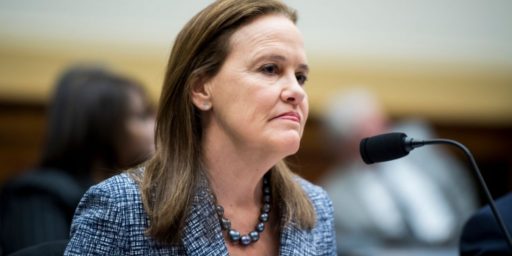
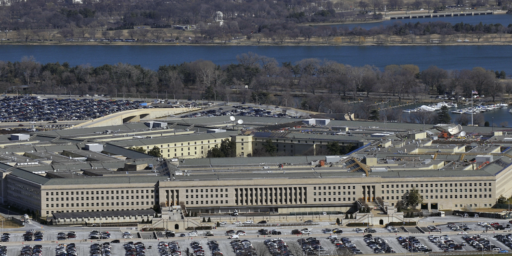
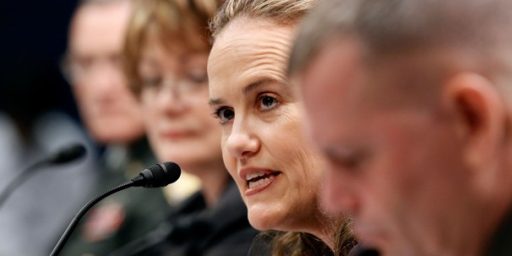

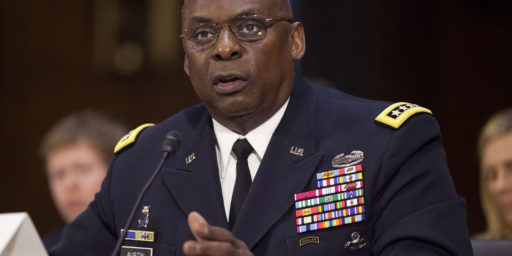
Libya has been such an unmitigated disaster that in my view anybody who supported intervention should be automatically disqualified- let’s be clear this support occurred after the Iraqi War 2- so these supporters learned absolutely nothing.
Perhaps it’s no more complicated than the fact that there are a host of equal or better options available – all of them princes of the female gender – who don’t bring the same – or at least the same degree of – baggage to the set. I wouldn’t consider it fair to lay the blame for all of that baggage at her feet, but I can’t pretend that it doesnt exist either. When you’re faced with cleaning up a mess of the magnitude Biden is inheriting, it’s prudent to avoid drama when you don’t necessarily have to endure it. I’m persuaded that’s what’s on the table here.
If it’s not Flournoy, that would be a relief. For an explanation of why, check out Andrew Bacevich’s critique in American Prospect. It’s not just that she’s too interventionist.
My personal preference is a non-interventionist in this position. Especially given that Blinken definitely leans interventionist and Biden tends to be all over the map on this.
To that point as well, while its important to have a working relationship between State and Defense, from my non-expert perspective (which to be fair means my opinion really shouldn’t be listened to at all), I’d prefer if the two were too chummy.
I don’t see what the problem is in choosing people. You turn on the TV, find an aging celebrity who is tangentially connected to the area of the office in question, and hire him. Just as long as he looks the part, you’re good!
Focusing on the question of too interventionist or not is too small a view to be choosing a Sec of Def., in reality that position will only be one voice in the room. The larger and really the most important question to focus on is what will be America’s defense philosophy for the next 25 years be and what are the needed weapons systems to support that philosophy.
Are carrier centric, naval battle groups on the cusp of being the new battleship? Does it make sense to continue development and acquisition of manned, piloted aircraft? In a world of cheap drone weapons, are armored battalions the new Calvary? Is the threat we need to focus on, not a physical attack, but a largely, poorly and undefended private data networks? What replaces these if they are obsolete? Those are really the questions that a Sec of Def needs to focus on. If you look at the defense appropriation that awaits trumps sig or veto, its allocation of funding for weapons development and acquisition is very similar to Obama’s Bush 43, Clinton and Bush 41.
@Sleeping Dog: Actually those are the decisions and recommendations the SECDEF mostly makes and/or tee’s up for the POTUS decision. The SECDEF does not decide whether to intervene or not. Depending on personality and experience they get weigh-in for WHAT we are going to do.
Some SECDEFs get more weigh in than others with POTUS on WHAT we will do…however, their primary purpose is to ensure the military is prepared to execute its portion of the HOW. They are also supposed to position our military forces to be prepared to execute the HOW in 20 years as best they can predict.
Whether the military intervenes or not is political decision–in my years knocking around the Defense Industry–its mostly made at the WhiteHouse and above the SECDEF. I would say the SECDEF that had the most influence on the political decision to intervene or not was Rumsfeld. The rest–obviously had sway but were mostly people that supplied the POTUS the HOW of what the Administration wanted to do.
I read the article someone posted in another thread about Bush being the Proto-Trump and I will say when it came to Iraq–almost everyone in a uniform was shut out of the planning of that Campaign. I must add that this is the President’s prerogative–they don’t have to listen or include experts in planning or advisement of military adventures. Frankly, the mission was under-resourced, had the wrong type of Force for long term success, and while everyone focuses on the last of Phase 4 (return to steady state) planning—the truth of the matter is Phase 4 execution was always doomed to failure. Why? State Department cannot force their civilian civil affairs experts to deploy. So if you have a occupy a Country with an active insurgency and you are trying to rebuild civil institutions with the experts not willing (and not safely) able to get on the ground and start working with locals–you are screwed.
Today we would do Iraq alot better because over the years DOD has build the Force into the premier counter-insurgency Force in the world. No one does it better than us. They’ve even brought State-department caliber experts into DOD who they CAN force to deploy if that were necessary. The problem is–that was the LAST war. Esper’s legacy is the 2017 National Defense Strategy which lists Russia/China and the nation’s top strategic threats. You can’t take on Russia/China with a counter-insurgency Force. You’d need the type of Force we used for the 1st Gulf War.
So the Biden Administration 1st task will be to decide if Team Trumps Nation Defense Strategy is still valid. If it is–his SECDEF is going to have to re-tool the Force to address those threats. If not, they are going to have to come up with a new Strategic vision for the nation’s defense today and over the next 20 years and answer many of the questions Sleeping Dog posed.
And oh BTW–what happens as you pair down your counter-terrorist force and leave ungoverned spaces like Afghanistan–and the terrorist return and start launching attacked against the US? These were grass-cutting operations and not the grass won’t be cut–doesn’t mean the threat went away. I get sick of people shouting about endless “wars”. We have High Schools that have more students than we have troops in various locations throughout the Middle East. These are small down payments that keeps teachers from getting their heads chopped off like what happened in France a few weeks ago. Jihadi’s aren’t going away–and while I personally agree with Esper on the nature on the threat–I also think its stupid to completely turn the page on the middle east.
TL/DR — Whether Flournoy is interventionist or not–is not a question that gives you the information you need to know about a SECDEF nominee
@Sleeping Dog:
Few strategy-oriented policy wonks are also good on those issues. I know I’m not. Flournoy certainly has outlined her vision on this and is on the “cut legacy systems” side of the debate. I don’t know whether that’s right but she does have a position.
@James Joyner: Well everyone is always for cutting legacy systems until they realize that interoperability across the services and with the Reserves & Guard suffers. This means the migration costs for moving everyone to the new system is twice the sticker price…so bean counters elect to stay with legacy systems with marginal upgrades.
@Jim Brown 32:
True, and that usually suffices. The question that needs to be answered, rather than rolling the log a bit longer is, are we at a technological inflection point that will make the legacy systems obsolete for the mission.
Remember that the first goal of our defense is to fight the war over there and not on our homeland.
@wr:
If Biden was Trump Rachel Maddow would be our next Attorney General.
@Michael Reynolds: And she would STILL be a better choice than Barr was.
@Sleeping Dog:
I’m inclined to be a bit sceptical when people start saying “development x means that force type y is now obsolete; embrace the new revolution in military affairs!”
In reality, things tend to be more evolutionary than revolutionary.
There will be networked/AI run anti-armour drones, recce nets, air defence systems etc.
But more likely gradually enhancing and modifying existing forces than sweeping them away.
The end of the manned aircraft has been “soon” since I was born: in the UK the 1957 Defence White Paper proclaimed that the end of manned aircraft for UK air defence and strategic offensive was in sight.
Still waiting.
Since the 1990’s there has been a steady chorus for European armies to switch to a light infantry plus air-mobile, counter-insurgency footing.
Especially since 2001: “Afghanistan shows the pattern of wars of the future”.
Which would leave everyone with their pants round their ankles if it came to a face-off with the Russians or another enemy with full-spectrum formations: choice of get slaughtered or go nuclear.
You may not always need the heavy metal boys, but when you need them you really need them.
As for “data systems security/cyber-warfare” it definitely need addressing; but are the armed forces the right people to take the lead on this? Perhaps a new civilian of civil/military setup would be better.
Because battleships were never successfully employed in the Pacific in WW2, it has led to them being dismissed as irrelevant.
But at least in part this is because the US Navy was obliged by Pearl Harbour to adopt a carrier-centric (and submarine warfare) approach, and then found it difficult to co-ordinate battleships with fast carriers; and the Japanese navy made a habit of mucking up their carrier/surface co-ordination.
If you look at the Atlantic, the Royal Navy for large parts of the war, was utterly horrified by the prospect of German battleship task units breaking out into the sea-lanes.
For “obsolete” units the UK put massive efforts into countering the Tirpitz, Bismarck, Schanhorst and Gneisenau. And were very thankful there were no more to contend with.
Perhaps Biden is looking for another Secretary with a name ending in -en?
“We are trying to outface the Russians, but the Secretary of State is Blinken!”
“We are trying to calm the markets, but the Treasury Secretary is Yellen!”
🙂
@Sleeping Dog: I actually think we can split the baby with a small investment in leap ahead technology and simply buying new models of old technology–which is still a generation or sometimes 2 ahead of peer competitors. For example, we don’t need to replace all of our F-16s with F-35s. We can get by with a single engine fighter that doesn’t exactly the same as what the F-16 does.
My fear is that we are making the same mistake the Germans did when they thought technology gave them the kill ratios to field a smaller force. They were right–until they met with a competitor that had the manufacturing capability to overwhelm their technology with numbers. A Sherman tank was no match for a German Panzer at even 3 to 1 ratio. It was inferior in range, speed, and maneuverability. That’s why the US simply threw 4+ Shermans at it.
Sure, we can out technology Russia–they can’t mass produce the numbers to overwhelm us. China on the other hand is a different ball of wax. We need to maintain a semblance of mass as well as technology. I am not optimistic that’s economically feasible under the current model of business between the US and its Defense Contractors. It literally costs $20,000 to turn a screw on a jet today. I doubt we’d get that substantial a discount on brand new 8os technology to make it worth it.
Currently DOD is moving down the road of aggressive Force modernization which always comes at the expense of Force manning. We’ll see if Biden changes course or continues forward